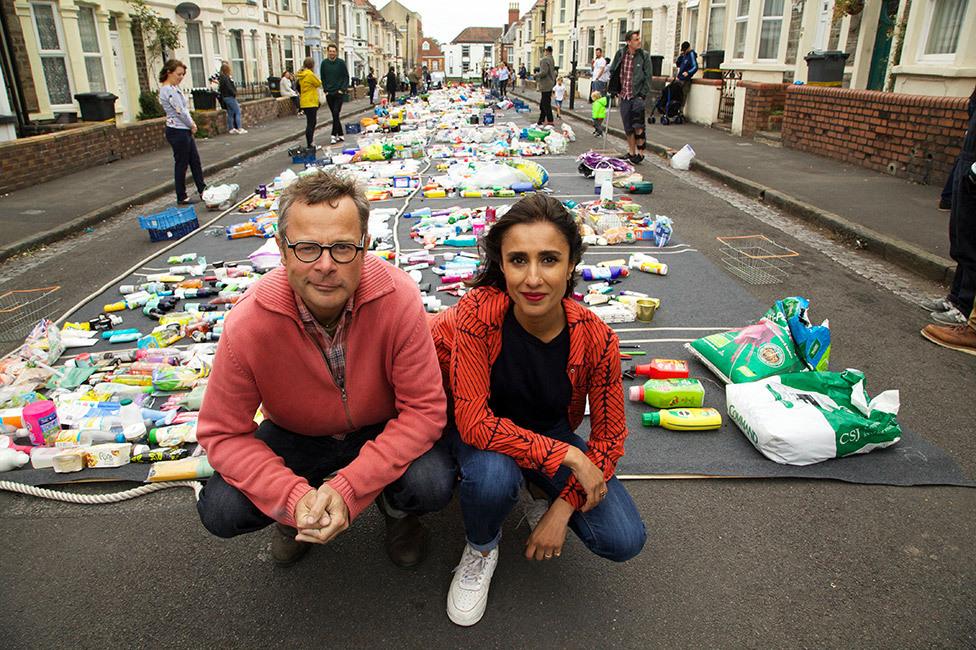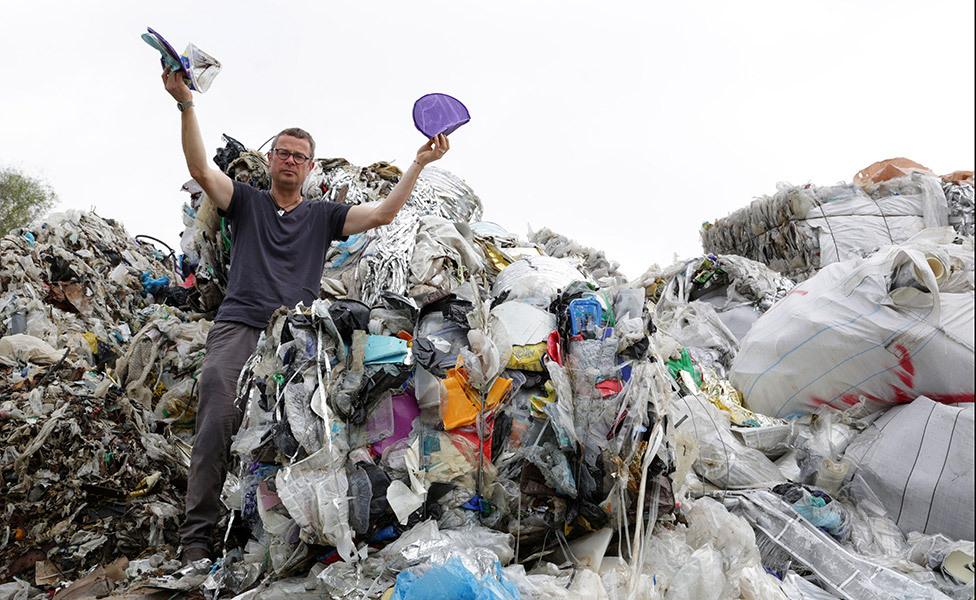A call to arms to fight the 'war on plastic'
- Published

Hugh and co-presenter Anita Rani on a street in Bristol where residents volunteered to help
Every minute of every day, a truckload of plastic enters our oceans. It destroys because it endures, breaking down into smaller pieces and particles.
And pretty much every size of particle is a problem - from the plastic bags that are filling up the stomachs of whales and turtles, to the smaller shreds that end up killing young seabirds, stuffed into them by their own desperate parents; to the microplastics that become carriers for lethal pathogens, and the nano-particles that we're all ingesting and inhaling.
And of course the problems are not just at sea.
Every second of every day, a truck load of plastics is being dumped in a developing country that simply doesn't have the capacity to deal with it.
I went to Malaysia at the end of last year to see this problem for myself, and it's absolutely horrible. I found myself walking across grim landscapes of trashed plastics, stacked up in bales and piles as far as the eye could see.
Shockingly, but somehow inevitably, there was no shortage of plastic from the UK.
Hugh finds piles of abandoned plastic at a recently closed Malaysian recycling plant
Tubs, bottles and trays from all-too familiar household brands, bags and plastics stamped with the logos of our leading supermarkets, and even recycling bin bags with the names of councils from all around the UK.
Most of this stuff is what we've put out, in good faith, as recycling - having no idea that our councils and waste companies were planning to send it half way round the world.
And I can tell you, it's very unlikely to be recycled. Malaysia, like many other developing countries, is completely overloaded with plastic waste from countries which actually do have the capability to process this plastic, but prefer simply to pass the problem on.
I also saw with watering eyes - and smelled, as wisps of the acrid smoke drifted into my nostrils - that a lot of it is being burnt.
Not in a controlled way: not in an incinerator, or to generate power. But open burning, on wasteland and by the side of roads, just to get rid of the stuff.
Perhaps the most distressing experience I had in Malaysia was visiting a family who lived near one of the burn sites.
Their little girl of about five was friendly and bubbly, but when I asked her about the smoke she was sad, and despite her age, actually quite angry.
Her eyes looked puffy and inflamed, and her mum showed me pictures on her phone of the terrible nosebleeds she'd been having.
She'd been suffering for more than six months, and her family were worried for her life. I went away ashamed to think that we in the UK could actually be sending some of the plastic the burning of which was making this little girl so ill.

A lot of this waste simply ends up being burnt
The "Blue Planet Effect" is not going back in the plastic bottle. Now people want to know what they can do to help, to make our lives better, and to make the Earth a better place to live.
One thing we can all do is get a reusable water bottle, and re-use it.
Our addiction to plastic-bottled water is out of control, growing globally by about 9% a year. But it's no better for us than UK tap water, which is safe to drink and often almost free.
The brilliant refill movement, external gives the expectation of a free water refill from any business with a clean kitchen. It should be the new normal. Restaurants, cafes and petrol stations must play their part.
"Keep-cups" for hot drinks are also a no-brainer, as is taking your own bags when you go shopping. But what else can you do to be the change you want to see?
Do you really need to plastic-wrap a coconut? Or a swede? Or carrots, or potatoes or apples come to that?
Where supermarkets are offering loose produce without the favoured plastic prison, it's usually more expensive - in Tesco by 40%, and Sainsbury's by 20% (for the standard government grocery shop that's used as an index).
Supermarkets are wising up, of course. Most are committing to "better recycling" and have signed up to the UK Plastics Pact, pledging all their packaging will be reusable, recyclable or compostable by 2025.
But we have to be wary. Recycling of plastics could easily become a smokescreen for a version of business as usual: "Hey everyone, we can now use as much plastic as we like."
That's a problem, because recycling is always "down-cycling" and it's never completely clean.
Science editor David Shukman explains how nappies can be recycled
We must focus on reducing, not just recycling. We must keep asking when it's right to use it, and when it can be avoided. And we must act on the answers fast.
That's where you come in. Everyone can play a part in reducing plastics on the planet. But we need to get government and big business to lead the way, recognise the things we want to change, and make it easier for us all to do the right thing.
Over one-third of plastic in our lives comes from supermarket shopping. Yet supermarkets say they listen to their customers.
So, as part of my BBC programme, I'm launching #OurPlasticFeedback.
We are gathering fantastic support from many people. But big names will not be nearly as effective in getting the change we need as a massive popular show of solidarity. That means you.
So please, when the moment comes in a couple of weeks' time, join us in wielding your power.
Together, for the health of our planet and all the wonderful life it supports, and for the quality of our own lives and our children's lives, we can end the plastic nightmare.
Our War on Plastic is broadcast on BBC One on Monday nights at 21:00 BST